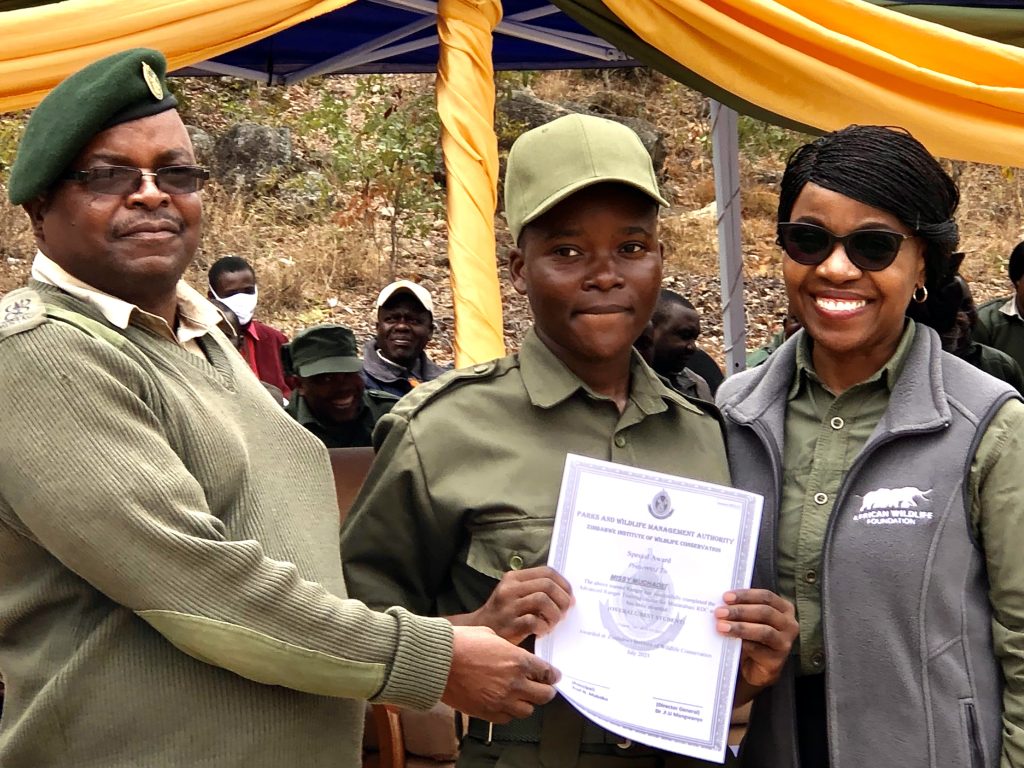-According to the AWF Country Director, this initiative demonstrates the necessity of engaging women in developmental areas such as conservation.
John Cassim

Masvingo, Zimbabwe (CZ) – The ground temperature was 3 degrees Celsius, and it was cloudy and drizzly, but the thrill of finishing a monthlong basic ranger training at the ZimParks run Zimbabwe Institute of Wildlife Conservation (ZIWC), also known as Mushandike in Masvingo, revealed the persistence instilled in the 28 graduates.
It was a cold day, but the young men and women spiced up the atmosphere with paramilitary marches, exercises, and a parade that convinced the audience that the addition of females in ranger training is a game changer.
The young (13 females) and (15 men) who graduated on July 21 were drawn from Mbire and Muzarabani, 577 km away, to train through the African Wildlife Foundation’s (AWF) 10-year conservation strategy, which strives to conserve wildlife and reduce poaching and trafficking in Zimbabwe.
The training was made possible courtesy of funding support from the Swedish International Development Agency (SIDA) under the ongoing ‘UTARIRI: Integrated and Adoptive Biodiversity, Climate, and Livelihoods Projects in the Zambezi Valley, 2022-2025.’
Olivia Mufute, Country Director of the African Wildlife Foundation, applauded the graduates for the resilience they are showing.
“I am excited to announce that of the total of 28 scouts who are graduating today, 13 are female and 15 are male.”
“This welcome development shows the importance of women’s inclusion in developmental aspects, including conservation of our natural resources and cultural heritage.”
“Worth noting is that the number of women trained on the basic ranger course has increased from the previous 5 trained by AWF in 2018 to 13 graduating today,” Olivia said.
– the basic training
The Senior Lecturer at the ZIWC, Blessing Chirombe, revealed that the basic course included theory and practical modules.
These modules equipped the young rangers with skills in ecological monitoring, ranger-based data collection, conducting problem animal management, human rights, Human-wildlife conflict, anti-poaching, field tracking, and many more.
“Mbire and Muzarabani are within the Zambezi Valley and are areas affected by human-wildlife conflict on a daily basis; however, the modules we offered them have taught them the value of both wildlife as a natural resource and the sanctity of human life,” Chirombe said.
During his address, ZIWC Principal Professor Never Muboko commended the graduates for showing discipline and agility, saying this will help them effectively deal with cases of human-wildlife conflict in their area.
“You covered quite a number of topics during your one-month stay, among them human-wildlife conflict, because I know from the areas that you come from that you face this on a daily basis as communities are facing these challenges,” Professor Muboko said.
He added, “The topic of human rights and law enforcement will help them know how to deal with suspects while upholding their rights as well.
In the past, we used to harass suspects; for example, we could even kick a pot on the fire without any evidence that the meat in the pot was indeed game meat. Things have changed now.”
-women’s empowerment
The women’s empowerment drive by AWF is reaping good results, as evidenced by the graduation results.
Of the four students who received awards, three were female, and the overall best student was 19-year-old Missy Muchadei, from Muzarabani.
Missy hails from a family of four and passed four subjects at Ordinary Level. She plans to continue with the conservation work while supplementing Mathematics so that she can advance her education.
The Most Disciplined student was Beatrice Kapota, aged 21, and a mother or two. She revealed that she dropped out of school while in Form 3 and married early.
She is planning to continue with her education and further pursue her ranger career so that she can take care of her young children.
AWF is working to increase the number of women rangers in a sector that has for ages been dominated by men.
In the past, it was difficult for women to access ranger jobs, which is still seen as a primarily male role.
Women have also traditionally been seen as weak and incapable, and therefore not given opportunities or respect when they have attempted to work.
This is the experience of many of the women, including rangers.
